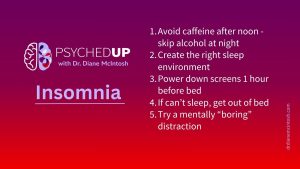
Struggling With Sleep? Here Are My Top Five Tips for Better Rest
I want to share my top five “sleep hygiene” habits that can support healthier sleep. They won’t solve chronic insomnia on their own, but they are essential ingredients for better rest.

Eating well, exercising, connecting with friends—these are the new doctor’s orders. Lifestyle medicine, which is essentially a prescription for the good habits, behaviours and choices we make as individuals, is a field of medicine that’s gaining traction, says Dr. Bryn Hyndman, a family doctor and former naturopathic in Vancouver, B.C. who recently chatted with Dr. Diane McIntosh about its increasing popularity.
“How we live has a tremendous impact on our day-to-day lives and how we feel,” Dr. Hyndman says. “There are all these factors in our life that really impact our risk of chronic disease.”
Alongside medications and surgical procedures, lifestyle medicine involves prescribing simple changes that people can make to their daily habits in order to prevent disease and optimize health. These interventions are meant to work alongside traditional medicine – patients are still prescribed medications when appropriate, but they are also counselled regarding lifestyle modifications that promote optimal wellness.
Lifestyle medicine isn’t a new-age concept unsupported by science, says Hyndman. There is actually scientific data, with many studies supporting such practices as forest bathing to support mental health, the role of the Mediterranean diet in preventing depression, or the impact of social contact on preventing mental illness.
And best of all, these interventions come with no side effects, can be easily adopted by patients and can have a powerful impact on mental health. “We need support for lifestyle medicine,” says Hyndman.
Mental and physical health are tightly correlated, and tackling health with just a prescription pad or a surgical procedure is like practicing with one arm tied behind your back.
Lifestyle medicine complements medications and procedures in addressing the “whole health” of the individual. Exercise, diet, social well-being and quality sleep are all key factors in whole health, and each is supported with ample research evidence underpinning its value.
The challenge at the moment is with integrating lifestyle medicine into traditional medical care to optimize patient outcomes, says Hyndman. She says that silos and time constraints within the healthcare system often prevent clinicians from looking at the whole picture – leading to an overreliance on other treatments without also considering lifestyle elements that could significantly impact health outcomes. While medications often play a critical role in the recovery from a mental illness, healthy lifestyle interventions can go a long way to help an individual get better faster and to stay well.
Hyndman says that in her practice she undertakes an assessment of a patient’s lifestyle to determine what conditions require drug treatment and which could be helped through diet and exercise. Then she develops a treatment plan that incorporates elements of traditional medicine and elements of lifestyle medicine.
“These habits should be integrated into every medical interaction with your family doctor, nurse practitioner and with your psychiatrist,” she says, adding, “Lifestyle medicine isn’t the be-all and end-all, but let’s just become more aware of how we’re living.”
This blog post is part of a series looking at the state of our mental healthcare system and ways we can create sustainable change to improve quality and outcomes for anyone impacted by mental illness.

I want to share my top five “sleep hygiene” habits that can support healthier sleep. They won’t solve chronic insomnia on their own, but they are essential ingredients for better rest.

There’s something about flipping the page on the calendar from December to January. For many of us, the beginning of a new year represents a clean slate. So, if you find yourself in the mood to take that time to pause and reflect after the holidays, here are a few tips on making smart New Year’s resolutions.

The holidays can be stressful. Here are a few thoughts on how to make the most of what can be a most wonderful time of the year.
Please provide your contact information in the form below. It helps if you provide enough detail in your message so we can help. We look forward to hearing from you!
Thank you for your message. We will respond to your email promptly.